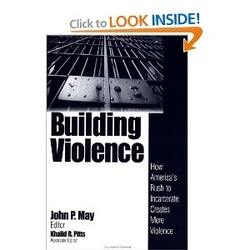
"Let's not be hasty" is one of the first tenets of wisdom, but America in general and California in particular is trampling that tenet as it herds offenders and alleged offenders into jails and prisons as hastily as possible. Wisdom, as well as justice, is crushed in the stampede– a stampede supposedly driven by justice and tough-minded wisdom.
Building Violence was one of the first scholarly books to document the effects and speak to the causes of the country's rush, since the 1980s, to incarcerate larger portions of our population. It addressed mass incarceration before it became a popular term.
Many of the contributors to Building Violence are esteemed professionals in the correctional field or long-term advocates of reform. They not only make excellent points, but they back their articles up with references. I highly recommend the thought-provoking articles by Colleen McLaughlin, Kenneth L. McGinnis, Juan Williams and Tony Whitehead.
For a more recent treatment of the issue of mass incarceration read Michelle Alexander's New York Times bestseller The New Jim Crow. She documents the link between the War on Drugs and bad government policy to the boom in prison construction. Some of her revelations are shocking. Who knew that the War on Drugs was actually formally declared before the traffic of cocaine into the United States became a major problem? And how many people knew that trusted government officials in the CIA turned a blind eye as their informants, working for the Nicaraguan Contra rebels, funneled millions of tons of cocaine into this country in order to fund their war efforts back in Nicaragua? Somehow those details seem to have escaped modern history books, but Ms. Alexander supports them with indisputable references. These things did happen and they should make us look with skepticism at both the War on Drugs and the country's rush to incarcerate masses of our population.
My staunch conservative readers might not be ready to read The New Jim Crow. For them, I recommend the new proposal about mass incarceration from the Brennan Center for Justice.
Mass incarceration is indeed recognized as a problem on both sides of the political aisle, and enough common ground exists for our State and Federal legislatures to make immediate progress toward solving it... if only more people demanded that sort of change...
Building Violence was one of the first scholarly books to document the effects and speak to the causes of the country's rush, since the 1980s, to incarcerate larger portions of our population. It addressed mass incarceration before it became a popular term.
Many of the contributors to Building Violence are esteemed professionals in the correctional field or long-term advocates of reform. They not only make excellent points, but they back their articles up with references. I highly recommend the thought-provoking articles by Colleen McLaughlin, Kenneth L. McGinnis, Juan Williams and Tony Whitehead.
For a more recent treatment of the issue of mass incarceration read Michelle Alexander's New York Times bestseller The New Jim Crow. She documents the link between the War on Drugs and bad government policy to the boom in prison construction. Some of her revelations are shocking. Who knew that the War on Drugs was actually formally declared before the traffic of cocaine into the United States became a major problem? And how many people knew that trusted government officials in the CIA turned a blind eye as their informants, working for the Nicaraguan Contra rebels, funneled millions of tons of cocaine into this country in order to fund their war efforts back in Nicaragua? Somehow those details seem to have escaped modern history books, but Ms. Alexander supports them with indisputable references. These things did happen and they should make us look with skepticism at both the War on Drugs and the country's rush to incarcerate masses of our population.
My staunch conservative readers might not be ready to read The New Jim Crow. For them, I recommend the new proposal about mass incarceration from the Brennan Center for Justice.
Mass incarceration is indeed recognized as a problem on both sides of the political aisle, and enough common ground exists for our State and Federal legislatures to make immediate progress toward solving it... if only more people demanded that sort of change...
 RSS Feed
RSS Feed
